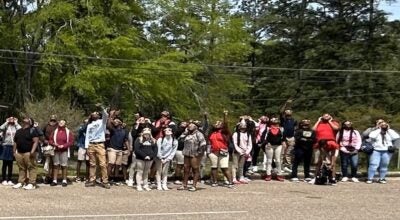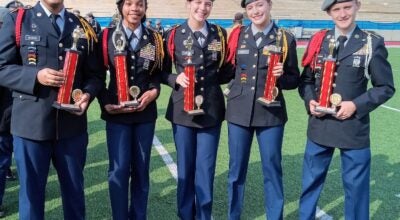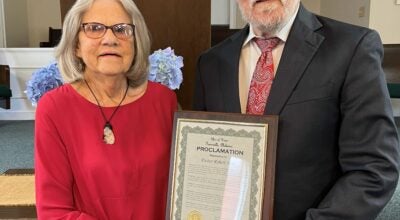A native soldier on his experiences at war
Published 5:40 pm Friday, December 26, 2008
Butler County native Oliver Brooks Jr. would normally be celebrating the holidays with his wife and two daughters in Stone Mountain, Ga., where he works for Comcast Cable.
However, the 1981 graduate of Greenville High and 1986 graduate of Alabama State University was far from his loved ones this Christmas.
As LTC Oliver Brooks, commander of the 729 Facility Engineer Detachment from Decatur, Ga., he is serving his country in Iraq this holiday season.
“We are currently working with the 555th Engineer Brigade from Ft. Lewis, Washington and conduct operations out of Joint Base Balad (JBB), Iraq, about 50 miles north of Baghdad, Iraq,” Brooks said.
Brooks’ team helps support construction operations and other initiatives for the construction segment of the 555th EN BDE. Army Engineer Officers and NCOS with a variety of civilian backgrounds make up the team, Brooks said.
“Our responsibilities include project management, project tracking, statements of worka, design/engineering, reconnaissance missions, QA/QC, bridge assessments, contract management and representation, and a host of other engineer-related services,” Brooks explained.
“On occasion, we also work alongside Air Force, Navy and Marine personnel.”
What’s a typical day like for LTC Brooks?
“My day usually starts with either briefings or the proverbial checking of e-mail. After that, I may have other meetings or conferences to attend,” Brooks said.
“My physical training (PT) is self-paced, so I exercise as time permits – usually at night.”
And while the grub is good in the dining facility, “it tends to be repetitious, so I try to get something on each visit, unless my personal favorites are being served.”
Readers might be surprised to learn Brooks also has spots like Burger King, Subway, Popeye’s, Green Bean Coffee and Taco Bell to choose from.
“JBB actually has more amenities than some small cities, but what would you expect form a base that supports 30 thousand troops, DOD civilians and contractors?” he added.
And what can troops and civilians do during their down time?
The Morale, Welfare and Recreation (MWR) opportunities at JBB are “pretty good.”
Two swimming pools, a movie theater, and several gyms are available, and “there is always something going on in one of the MWR buildings – chess or checkers, card game tournaments, dances, body building contests, computers – and more,” Brooks said.
Basketball, softball, volleyball and football leagues, different times of dance nights and physical work out sessions offer further activities to relax, unwind, stay fit and have fun.
“These opportunities give us the chance to alleviate the reality of being here and provide the recognizable comfort to diminish the severity of some of these soldiers’ daily routines,” Brooks said, adding, “Not every base has the same level of MWR activity.”
Brooks says the security situation in Iraq “is getting much better.”
“We are experiencing a decrease in attacks, from over 100 per day down to less than 15 per day, and definitely a decrease in casualty-producing attacks,” he said.
The reduction, Brooks says, is due to increased and sustained military operations, interaction with the Coalition Forces and/or the Iraqi Army in and around their communities, along with an increase in mine-resistant armored vehicles by the American forces.
Most current attacks are against “targets of opportunity,” making non-coalition forces and civilians vulnerable. Al-Qeda in Iraq (AQI) and other terrorist cells readily recruit and/or force Iraqi citizens to carry out attacks.
“The insurgents are still trying to break the will of the country and its people,” Brooks said.
“This country is war-torn and in some areas, there is still a recognizable underlying cause. You have to realize years of oppression, both mental and physical, have created a society that was and is dependent on others for their needs.”
He says his own feelings about the U.S. involvement in Iraq are “kind of mixed.”
“Right, wrong, or indifferent to the circumstances, there has been a great injustice on the people of this country,” Brooks said.
“When you recognize the state of living that many in Iraq have had to endure, I find reason to be happy and content with what I have and the opportunities that exist in my country.”
He says progress in construction has remained steady with a major trend toward awarding construction contracts to Iraqi-owned firms, but there are challenges.
“There is limited availability of experienced engineers, technicians, project managers and scientists with these firms. In the previous regime, those not on board with Saddam’s actions either left the country or received harsh treatment,” Brooks explained.
“There are a few Iraqi-born professionals, expatriated, who have returned to work alongside coalition forces.”
These Iraqis have helped bridge the gap and increase engineer expertise.
“Their presence has also helped put an Iraqi face on construction projects and initiatives needed to increase civil capacity. Our coalition forces concentrate mostly on military construction projects on bases and/or immediate repair or replacement of structures on supply routes,” Brooks said.
According to Brooks, a number of programs are also in place and used by military commanders in Iraq to try to invigorate the local economy by developing jobs and skilled labor.
Former Sons of Iraq have been targeted to help develop technical skills including road repair, road sanitation, electrical, carpentry, masonry and plumbing skills.
“Prior to the present government, a lot of the construction projects were led by non-Iraqi contractors, contributing directly to the present lull in Iraqi construction experience,” Brooks said.
While Brooks, who was deployed to Iraq in April ‘08, would definitely prefer to be at home this season with family and friends, he says he won’t complain about his time of service in Iraq.
“This is an all-volunteer army. The situation in Iraq is getting better, but there are still hot spots for violence, and our forces are doing their best to eliminate the threat,” Brooks said.
“We understand the requirement, which sometimes involves deployment, even multiple deployments, and for some, there will be more deployments to this war-torn country. Most of us serve because we have a sense of duty and respect for our great country – and that makes it worth the effort.”
Brooks sends special thanks to all whom have sent correspondence, including letters, care packages or email, to him or any of his soldiers.
“Getting things – anything positive – is a great morale booster. And we also appreciate your thoughts and prayers so much,” Brooks said.





